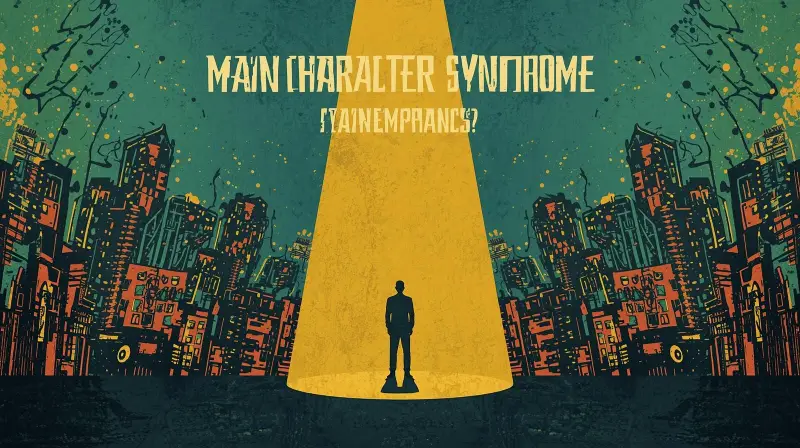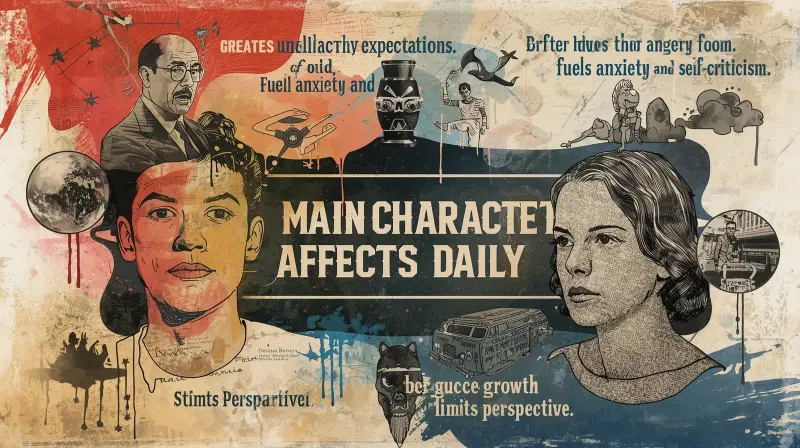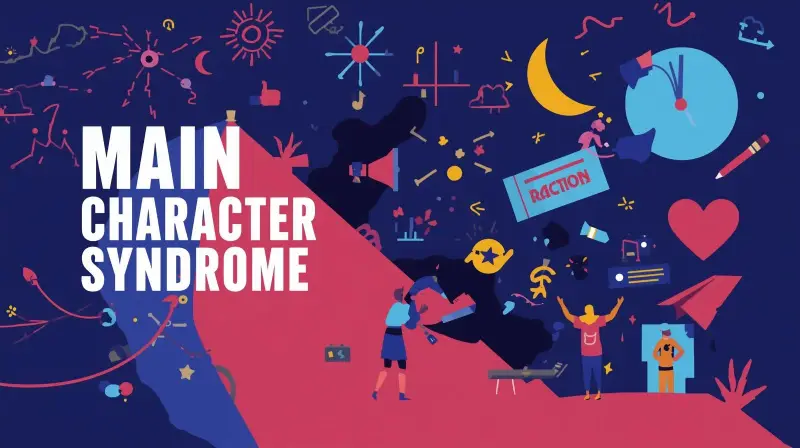We all want to feel special. It’s human. But sometimes that desire gets a little louder than it should. You start seeing your life like a movie. You’re the star, and everyone else? Just side characters in your plotline. This isn’t always a bad thing. But when it starts affecting your reality and how you treat others, it may be a sign of something people now call Main Character Syndrome.
Main Character Syndrome is a term that grew out of social media culture, especially from platforms like TikTok and Instagram, where people document their lives in a stylized, cinematic way. It has become shorthand for the habit of turning daily life into a story where you are the main event. While this mindset can be empowering in small doses, it can also lead to detachment from the real world. The danger lies in forgetting that everyone around you has their own storyline, their own needs, and their own challenges.
But what exactly is it? Is it even real? And if it is, does that mean you’re self-obsessed? Or is it just a modern way to describe something all of us feel sometimes?
Let’s break it down.
What is Main Character Syndrome?

Main Character Syndrome is not an official mental health diagnosis. It’s more of a pop culture term. The phrase took off on social media, especially TikTok, where people film themselves doing everyday things like sipping coffee or walking through a park with captions like “Just living my main character life.”
On the surface, it sounds empowering. Romanticize your life. Be confident. But the deeper meaning refers to when someone starts viewing everything through a self-centered lens. Every situation is about them. Every relationship is about how it serves their story. This can lead to disconnection from reality and from others. At its core, it’s when you start acting like life is a movie, and you forget that real people with real feelings exist outside your own narrative.
How Did the Term ‘Main Character Syndrome’ Become Popular?
The term main character syndrome didn’t come from psychology textbooks; it came from the internet. It started gaining traction around 2020, mostly on TikTok and Twitter. People began using it to describe those who acted like they were the center of the universe, often in a slightly ironic or mocking way. The phrase blew up when users started making short videos romanticizing their daily lives, with captions like “main character energy.” These clips showed people doing simple things, drinking coffee, walking alone, staring out train windows, as if they were starring in an indie film.
At first, it felt empowering. It encouraged people to value themselves and to take charge of their story. But over time, it took a turn. What started as a celebration of self-love became a way to call out self-obsession. People began using it to criticize those who did everything about themselves, ignored others’ feelings, or posted overly curated versions of their lives online. From viral trends to serious conversations, the term stuck and now it’s a common way to describe how social media can blur the line between self-awareness and self-centeredness.
Signs You Might Have Main Character Syndrome

You don’t need to be dramatic or obsessed with selfies to fall into this mindset. Main Character Syndrome can show up in subtle ways too. Here are a few signs to look out for:
1. You constantly feel like life is happening to you, not with you.
When you have this syndrome, you might often feel like the world is setting you up for scenes, not experiences. Whether you miss a train or go through a breakup, you interpret these events as acts written in your life’s script rather than natural bumps in life. It can make you feel powerless because you’re always reacting instead of engaging. Instead of asking, “What can I do about this?” you start thinking, “Why is this happening to me?” This passive mindset keeps you stuck in a loop where every problem is a tragedy meant only for your suffering, rather than something shared by many.
2. You often “make” conversations about yourself.
Pay attention to your conversations. Do you listen to understand, or do you listen to replies? People with Main Character Syndrome tend to redirect discussions back to their own stories, struggles, or opinions. Even when a friend is sharing something personal, your mind races to find a similar experience you had, just so you can jump in and talk. It isn’t always on purpose, but it shows a habit of centering yourself. Over time, this can leave others feeling unseen and unheard of. Friendships and relationships start to feel one-sided, where you do most of the talking but little of the listening.
3. You think others exist in your life just to help you grow.
You begin to view people not as individuals, but as characters in your journey. Someone breaks your heart? He was just a lesson. Someone challenges you? She was the villain. This mindset can make you overlook the real depth of people. It becomes easier to dismiss their pain, flaws, or complexities because you reduce them to what they meant to you. You stop seeing people as people and instead assign them roles. And once someone no longer fits in your narrative, you may cut them off without much thought.
4. You crave attention and validation more than connection.
The line between sharing and performing becomes blurry. You might find yourself documenting your life not for memories, but for applause. Whether it’s a gym selfie or a long post about a bad day, the goal is to be noticed. While there’s nothing wrong with wanting support, constant need for validation can leave you feeling empty when it doesn’t come. You may start to measure your worth by likes, comments, or compliments. Real, messy, silent connection begins to feel boring or less rewarding. You become addicted to being seen, not to being understood.
5. You ignore feedback or criticism.
Constructive criticism can feel like a personal attack when you see yourself as the main character. Any attempt by others to point out flaws or areas for growth gets dismissed with defensiveness. You might think, “They just don’t get me,” instead of, “Maybe there’s something to learn here.” Growth becomes difficult because you view yourself as already being the hero, already on the right path. But real life isn’t a movie. Growth comes from mistakes, accountability, and the ability to listen, not just to speak.
6. You often daydream about being admired or envied.
You catch yourself imagining scenarios where people notice how well you handled something, how good you looked, or how strong you were in a difficult moment. It might be a fantasy of an ex regretting losing you or a stranger being impressed by your aura. These daydreams are comforting, but they can also pull you away from the present. Instead of focusing on being present or improving, you’re stuck imagining how others see you. You start living for the reaction, not the moment.
How Main Character Syndrome Affects Daily Life

It creates unrealistic expectations
When you start seeing your life as a movie, you expect every moment to be thrilling, emotional, or life changing. You want every walk to feel like a scene, every conversation to carry weight. But the truth is, life has a lot of stillness and repetition. It has slow days. When you crave constant highs, the quiet in-between moments feel empty. That disconnect between expectation and reality can leave you feeling stuck, like something is wrong with your life when really, you’re just experiencing what everyone else is: normalcy.
It weakens relationships
If you’re always in the spotlight in your own mind, others might start feeling invisible. When you treat people like extras in your movie. You only show up when it benefits your narrative and believe it, your partner notice the pattern. They may start to feel like they’re emotionally sidelined. You might miss their silent cries for help or ignore their wins because you’re too caught up in your own emotional arc. Slowly, they detach, and the loneliness creeps in, not because they abandoned you, but because they were never fully seen.
It fuels anxiety and self-criticism
Being the “main character” means the pressure is always on. You begin curating your behavior as if an audience is watching. This hyper-awareness can make you obsessive about how you look, how you speak, and how you appear on social media. You’re not living, you’re performing. That kind of constant self-monitoring is mentally draining. Any slip-up starts to feel massive. You become your own harshest critic, constantly worried you’re not living up to the role you’ve played for yourself.
It stunts personal growth
When you only see yourself as the lead, it’s hard to admit you’re still learning. Flaws are edited out of the script. Mistakes feel like plot holes, not learning curves. But growth doesn’t happen when you’re trying to protect your image. It happens when you allow yourself to be raw and real, when you accept discomfort instead of covering it up. You can’t evolve if you’re too busy defending your character arc instead of rewriting it when needed.
It limits your perspective
Being absorbed in your own world can make you forget other people’s stories matter just as much. You stop really listening. Conversations become one-sided. Over time, you lose the ability to connect deeply because empathy requires stepping outside yourself. When your lens is always focused inward, you miss out on the richness that comes from truly witnessing other lives unfold around you.
How to Find Balance

Practice Mindfulness
Mindfulness isn’t about silencing your thoughts. It’s about noticing them without getting carried away. When you’re mindful, you see what’s in front of you rather than what your imagination is spinning. It helps you stay present, whether you’re doing laundry or having coffee with a friend. Those little moments stop feeling empty and start to feel real.
Shift your Focus
Ask people about their day. Listen without waiting for your turn to speak. Try not to do everything about you. The more curious you are about others, the less you’ll feel like you’re stuck in your own mental echo chamber. Relationships deepen when you stop performing and start participating.
Limit Performative Posting
You don’t have to share every win, loss, or outfit. Some things are more meaningful when they’re just yours. Social media rewards dramatics, but life isn’t a stage. Make room for private moments. Write them down, reflect, feel them. You’ll start building a life that feels lived, not broadcast.
Accept the Mundane
Not every day will feel magical, and that’s okay. Learn to enjoy slow mornings, simple routines, and quiet evenings. When you stop chasing high points, you start to find peace in everyday rhythms. Ordinary doesn’t mean meaningless things. Sometimes, the softest days are the ones that shape you the most.
Accept Feedback
Not every comment is an attack. Sometimes, people who care about you will point out things you don’t want to hear. Let them say what they want. You don’t have to agree with every critique, but listening helps. Growth isn’t about keeping your image clean. It’s about being brave enough to admit when you’re wrong and open enough to change.
Connect Deeply
Go past small talk. Ask real questions. Be there for people without expecting a return. Emotional closeness builds when both sides feel seen and heard. When you stop needing to be admired and start aiming to be understood, the whole dynamic shifts. You feel more human. More at ease.
Remind yourself: You are not the only one living a story
Everyone is the main character of their own story. Remind yourself that you can’t force someone to make “you” the hero of their life. When that really sinks in, something changes. You stop feeling the need to impress. You stop racing to “arrive.” You begin to connect instead of competing. And slowly, you start living more honestly, more fully, without needing to be the star of every scene.
Conclusion
Main Character Syndrome isn’t always loud or obvious. Sometimes it’s just that quiet pressure in your chest to make life look more interesting, more successful, more perfect than it really is. But life isn’t a scripted movie. It’s messy, unpredictable, and often beautifully ordinary. You don’t have to be constantly inspiring. You don’t have to “win” every scene. You just must show up honestly, fully, and with room for others in the frame. When you shift your focus from performing to connecting, from spotlight to shared space, you give yourself permission to grow. To rest. To be human. And in doing that, you’ll find that your story becomes richer, not because it’s all about you, but because it’s real.




